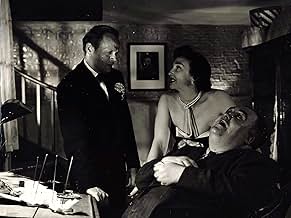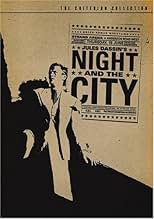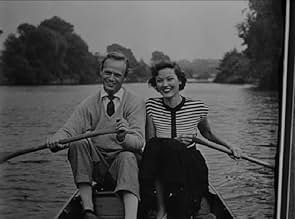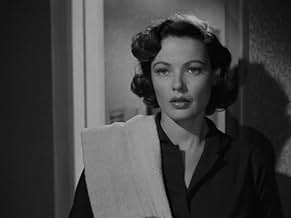IMDb-BEWERTUNG
7,8/10
16.102
IHRE BEWERTUNG
Ein kleiner Trickbetrüger und Nachtclub-Tourist nutzt einige zufällige Umstände aus und versucht, als Ringkampfveranstalter eine große Rolle zu spielen.Ein kleiner Trickbetrüger und Nachtclub-Tourist nutzt einige zufällige Umstände aus und versucht, als Ringkampfveranstalter eine große Rolle zu spielen.Ein kleiner Trickbetrüger und Nachtclub-Tourist nutzt einige zufällige Umstände aus und versucht, als Ringkampfveranstalter eine große Rolle zu spielen.
Ken Richmond
- Nikolas of Athens
- (as Ken. Richmond)
Paul Beradi
- Diner
- (Nicht genannt)
Derek Blomfield
- Young Policeman
- (Nicht genannt)
Clifford Buckton
- Policeman
- (Nicht genannt)
Ernest Butcher
- Bert
- (Nicht genannt)
Peter Butterworth
- Thug
- (Nicht genannt)
Naomi Chance
- Nightclub Hostess
- (Nicht genannt)
Edward Chapman
- Hoskins
- (Nicht genannt)
Empfohlene Bewertungen
Night and the City (1950)
*** (out of 4)
Hard-hitting crime film has Richard Widmark playing Harry Fabian, a loser who is constantly getting himself in trouble by either owing money or hurting those closest to him like the girl (Gene Tierney) who loves him. Soon Harry comes up with a scheme to try and take over the underworld of wrestling but an accident leaves an entire mob and city after him. Widmark, in an excellent performance, gets top-billing but there's no question that the real star here is the cinematography by Mutz Greenbaum. The B&W images are so incredibly strong here that they pretty much become their own character as the camera perfectly picks up this underworld full of gamblers, mobsters, drunken fools and hopeless dreamers like Harry. The cinematography is so strong here and director Dassin has no trouble at all building up a very rich atmosphere and it's almost as if you can smell the stink of the streets and you'll feel like a shower just to get all the smoke off of you. The story itself is pretty good because I'm sure everyone has come across a guy like Fabian so it's easy to see his tricks and enjoy his charisma but at the same time any sane person could see what a danger he was to himself. Widmark does a terrific job in the role because he's got a certain charm that you just have to fall for and at the same time he can be such a snake where you want to see something bad happen to him. The screenplay does a great job at really building up his character as we see his good and bad qualities and Widmark hits all the right notes with them. Tierney is excellent as well as his tortured girlfriend. Googie Withers, Herbert Lom, Hugh Marlowe and Francis L. Sullivan are all terrific as well. Back to the cinematography, the final scenes with Widmark running around London trying to escape are breathtakingly beautiful. We've seen countless chase scenes before and since this movie but the one here is a prime example of getting it done right.
*** (out of 4)
Hard-hitting crime film has Richard Widmark playing Harry Fabian, a loser who is constantly getting himself in trouble by either owing money or hurting those closest to him like the girl (Gene Tierney) who loves him. Soon Harry comes up with a scheme to try and take over the underworld of wrestling but an accident leaves an entire mob and city after him. Widmark, in an excellent performance, gets top-billing but there's no question that the real star here is the cinematography by Mutz Greenbaum. The B&W images are so incredibly strong here that they pretty much become their own character as the camera perfectly picks up this underworld full of gamblers, mobsters, drunken fools and hopeless dreamers like Harry. The cinematography is so strong here and director Dassin has no trouble at all building up a very rich atmosphere and it's almost as if you can smell the stink of the streets and you'll feel like a shower just to get all the smoke off of you. The story itself is pretty good because I'm sure everyone has come across a guy like Fabian so it's easy to see his tricks and enjoy his charisma but at the same time any sane person could see what a danger he was to himself. Widmark does a terrific job in the role because he's got a certain charm that you just have to fall for and at the same time he can be such a snake where you want to see something bad happen to him. The screenplay does a great job at really building up his character as we see his good and bad qualities and Widmark hits all the right notes with them. Tierney is excellent as well as his tortured girlfriend. Googie Withers, Herbert Lom, Hugh Marlowe and Francis L. Sullivan are all terrific as well. Back to the cinematography, the final scenes with Widmark running around London trying to escape are breathtakingly beautiful. We've seen countless chase scenes before and since this movie but the one here is a prime example of getting it done right.
This gritty film, exposing the world of small time crooks in London, is a real masterpiece of film noir. The director, Jules Dassin, has captured this dark, dirty world perfectly and the black and white cinematography is superb. Richard Widmark is as despicable here as he was as Tommy Udo in "Kiss of Death"...it is a coup of casting. Francis Sullivan as Phil is great as the nightclub owner for whom Widmark shills and Googie Withers, one of my favorites of British film, is awesome as the unfaithful wife. Gene Tierney is wasted as Widmark's girlfriend...she does not seem to have much to do. Other support players are strong and you get to see Herbert Lom without his toupee! This is one of the best in the film noir genre and the ending pulls no punches. This is not a happy, feel good film. Highly recommended.
My favorite Richard Widmark performance on the screen and probably his best work is Night and the City. This was director Jules Dassin's last film before settling in Europe in the wake of the blacklist and it has a first rate cast tuned to a fine pitch, like an orchestra without a bad note in it.
Harry Fabian is this smalltime American hustler/conman who's settled in London and always working that middle ground netherworld between the law and outright gangsterism. He really isn't a very likable man and the trick is to keep the audience care what's happening to him. This is the test of a great actor and Widmark is fully up to the challenge.
Fabian while working one of his cons overhears a piece of information about the father/son relationship between champion Graeco-Roman wrestler Gregorius the Great and gangster/promoter Cristo who is the London version of Vince McMahon. He cons Gregorius into thinking he wants to promote old style wrestling like Gregorius used to do. That con game sets in motion the events of the film that ultimately end in tragedy.
The cast is uniformly fine, but one performance really stands out, that of Stanislaus Zbyzsko as Gregorius. He was a real professional wrestling champion back in the day when it was real. Zbyzsko invests so much of his own life and reality as Gregorius that he's really something special. His scenes with Herbert Lom as his son are so good they go far beyond the plane of mere acting. It's some of the best work Lom has ever done as well.
How there weren't a few Oscar nominations from this is a mystery for me. For those who like film noir, this should be required viewing. Especially for you Richard Widmark fans.
Harry Fabian is this smalltime American hustler/conman who's settled in London and always working that middle ground netherworld between the law and outright gangsterism. He really isn't a very likable man and the trick is to keep the audience care what's happening to him. This is the test of a great actor and Widmark is fully up to the challenge.
Fabian while working one of his cons overhears a piece of information about the father/son relationship between champion Graeco-Roman wrestler Gregorius the Great and gangster/promoter Cristo who is the London version of Vince McMahon. He cons Gregorius into thinking he wants to promote old style wrestling like Gregorius used to do. That con game sets in motion the events of the film that ultimately end in tragedy.
The cast is uniformly fine, but one performance really stands out, that of Stanislaus Zbyzsko as Gregorius. He was a real professional wrestling champion back in the day when it was real. Zbyzsko invests so much of his own life and reality as Gregorius that he's really something special. His scenes with Herbert Lom as his son are so good they go far beyond the plane of mere acting. It's some of the best work Lom has ever done as well.
How there weren't a few Oscar nominations from this is a mystery for me. For those who like film noir, this should be required viewing. Especially for you Richard Widmark fans.
The rise and fall of small-time hustler Harry Fabain is chronicled in this noir thriller by Director Jules Dassin.
This was Dassin's American swansong, completed just before being named by fellow director Ed Dmytryk before HUAK as a "communist," thus ending Dassin's American career.
He brought to "Night and the City" all the technique he acquired over years of quality movie making. Although born in Connecticut and raised and trained in the US, Dassin's work always had the look and feel of his European counterpart, Carol Reed.
The script here is a decent one with surprise turns, avoiding predictability. Franz Waxman's high pitched score adds excitement to the proceedings and Gene Tierney is a creditable second lead.
Yet it's Richard Widmark on whose shoulders the success of this film ultimately rests. It's not an easy role, as Fabian's character runs the gamut of emotional range as he struggles to wheel and deal his petty schemes amongst assorted lowlife types.
Widmark proves he's well up to the challenge, creating a strong portrait of a small time hood striving for positive payoffs through his callous cleverness.
It's a reminder of how talented and resourceful this actor is, and how he and Dassin meshed to create a film of impact.
Dassin, of course, went on to France after this to engage in a fabulous European period, while Widmark struggled to find scripts worthy of his formidable talents, which turned out to be few and far between.
This was Dassin's American swansong, completed just before being named by fellow director Ed Dmytryk before HUAK as a "communist," thus ending Dassin's American career.
He brought to "Night and the City" all the technique he acquired over years of quality movie making. Although born in Connecticut and raised and trained in the US, Dassin's work always had the look and feel of his European counterpart, Carol Reed.
The script here is a decent one with surprise turns, avoiding predictability. Franz Waxman's high pitched score adds excitement to the proceedings and Gene Tierney is a creditable second lead.
Yet it's Richard Widmark on whose shoulders the success of this film ultimately rests. It's not an easy role, as Fabian's character runs the gamut of emotional range as he struggles to wheel and deal his petty schemes amongst assorted lowlife types.
Widmark proves he's well up to the challenge, creating a strong portrait of a small time hood striving for positive payoffs through his callous cleverness.
It's a reminder of how talented and resourceful this actor is, and how he and Dassin meshed to create a film of impact.
Dassin, of course, went on to France after this to engage in a fabulous European period, while Widmark struggled to find scripts worthy of his formidable talents, which turned out to be few and far between.
"Night and the City" was the final film for Jules Dassin in the U.S. before being blacklisted. He eventually moved to France but didn't make another film until 1955. Though he is best remembered for the films he did with his wife, Melina Mercouri, this is one of his great movies, a very gritty film noir with London as its background.
Richard Widmark plays Harry Fabian, a low-life con man who makes money as a tout for a club, i.e., he seeks out male tourists and gets them to spend their money there. The club is owned by Phil Nosseross (Francis L. Sullivan) and his wife Helen, who hates her husband and wants to start her own business. Working there is Fabian's girlfriend (Gene Tierney) who loves him in spite of the fact that he's constantly borrowing or stealing money from her.
Harry hits on a scheme to break into wrestling promotion in London. Unfortunately, Kristo (Herbert Lom) has it sewn up. Though his father (Stanislaus Zbyszko, a real-life wrestler) was a great wrestling champion doing Greco-Roman boxing, Kristo does not promote it. This has actually caused a rift between father and son, and Harry moves right in. With the elder Kristo on his side, Harry gets his chance to promote Greco-Roman wrestling. He gets the needed money by promising Helen that he will get her a license to open her business, though the building supposedly can't be licensed for another year. The results of Harry's project lead to tragedy as he brings everybody down with him.
Filmed in black and white only adds to the grittiness of "Night and the City" as Harry runs through London. The film moves as swiftly as he does, leading to the inevitable but exciting climax.
This was a powerhouse role for Richard Widmark, who is a slimy, desperate, and fast-talking Harry. The problem with Harry is, he's really not that good of a con man. He's sloppy. He can get guys into the club but that's about it. He rubs the wrong people the wrong way, and he makes everyone angry until finally, he's a complete untouchable as Kristo chases after him. Widmark gives us a perfect portrait. Tierney is in the film only at the request of Zanuck, who wanted to distract her from her personal problems; she has a surprisingly small role. Herbert Lom is fantastic as Kristo. Stanislaus Zbyszko, whom Dassin sought out, gives a poignant performance as Gregorius the Great. The wonderfully talented Googie Withers is great as the cold and sophisticated Helen. You totally believes she loathes her husband. And Sullivan's Nesseros is easy to loathe as a wealthy worm who plays both ends against the middle to destroy Fabian. They all end up destroying themselves.
Apparently this film did not get appropriate distribution or something, because it's a great film, now out on DVD, and very few people know it. Hopefully, like "Nightmare Alley," another film that was ill-served by Hollywood, it will continue to gain in cult status. It deserves to be seen.
Richard Widmark plays Harry Fabian, a low-life con man who makes money as a tout for a club, i.e., he seeks out male tourists and gets them to spend their money there. The club is owned by Phil Nosseross (Francis L. Sullivan) and his wife Helen, who hates her husband and wants to start her own business. Working there is Fabian's girlfriend (Gene Tierney) who loves him in spite of the fact that he's constantly borrowing or stealing money from her.
Harry hits on a scheme to break into wrestling promotion in London. Unfortunately, Kristo (Herbert Lom) has it sewn up. Though his father (Stanislaus Zbyszko, a real-life wrestler) was a great wrestling champion doing Greco-Roman boxing, Kristo does not promote it. This has actually caused a rift between father and son, and Harry moves right in. With the elder Kristo on his side, Harry gets his chance to promote Greco-Roman wrestling. He gets the needed money by promising Helen that he will get her a license to open her business, though the building supposedly can't be licensed for another year. The results of Harry's project lead to tragedy as he brings everybody down with him.
Filmed in black and white only adds to the grittiness of "Night and the City" as Harry runs through London. The film moves as swiftly as he does, leading to the inevitable but exciting climax.
This was a powerhouse role for Richard Widmark, who is a slimy, desperate, and fast-talking Harry. The problem with Harry is, he's really not that good of a con man. He's sloppy. He can get guys into the club but that's about it. He rubs the wrong people the wrong way, and he makes everyone angry until finally, he's a complete untouchable as Kristo chases after him. Widmark gives us a perfect portrait. Tierney is in the film only at the request of Zanuck, who wanted to distract her from her personal problems; she has a surprisingly small role. Herbert Lom is fantastic as Kristo. Stanislaus Zbyszko, whom Dassin sought out, gives a poignant performance as Gregorius the Great. The wonderfully talented Googie Withers is great as the cold and sophisticated Helen. You totally believes she loathes her husband. And Sullivan's Nesseros is easy to loathe as a wealthy worm who plays both ends against the middle to destroy Fabian. They all end up destroying themselves.
Apparently this film did not get appropriate distribution or something, because it's a great film, now out on DVD, and very few people know it. Hopefully, like "Nightmare Alley," another film that was ill-served by Hollywood, it will continue to gain in cult status. It deserves to be seen.
Wusstest du schon
- WissenswertesDirector Jules Dassin made the film while in the process of being blacklisted. Fox studio chief Darryl F. Zanuck told him it could possibly be the last film he'd ever direct, so he should shoot the most expensive scenes first so the studio wouldn't be able to blacklist him until it was completed.
- PatzerAs Harry is being chased through the streets of London at night, he runs down a set of stairs, then turns and runs down a lit street. In the foreground, the cameraman and director's shadows are clearly outlined against the street.
- Zitate
Opening voice-over: Night and the city. The night is tonight, tomorrow night... or any night. The city is London.
- Alternative VersionenThere are two versions of this film: the British release and the International/American release. Some examples are: a differing voice-over speech; some changed dialogue; the opening scene where Harry returns home after 3 days away is a different take and the nightclub scenes are longer in the British version. The scores of the two films are also entirely different and alternate shots are used at the ending in the British version.
- VerbindungenEdited into American Cinema: Film Noir (1995)
- SoundtracksHere's to Champagne
(uncredited)
Written by Noel Gay
Performed by Gene Tierney (voice dubbed by Maudie Edwards)
Top-Auswahl
Melde dich zum Bewerten an und greife auf die Watchlist für personalisierte Empfehlungen zu.
- How long is Night and the City?Powered by Alexa
Details
- Erscheinungsdatum
- Herkunftsland
- Sprache
- Auch bekannt als
- Night and the City
- Drehorte
- Hammersmith Bridge, Hammersmith, London, England, Vereinigtes Königreich(Harry runs across this bridge after leaving Figler's hideout, running to Anna O'Leary's boat shop)
- Produktionsfirmen
- Weitere beteiligte Unternehmen bei IMDbPro anzeigen
Box Office
- Weltweiter Bruttoertrag
- 43.024 $
- Laufzeit
- 1 Std. 41 Min.(101 min)
- Farbe
- Seitenverhältnis
- 1.37 : 1
Zu dieser Seite beitragen
Bearbeitung vorschlagen oder fehlenden Inhalt hinzufügen




































